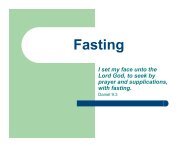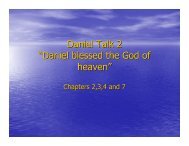Handout - Western Christadelphian Bible School
Handout - Western Christadelphian Bible School
Handout - Western Christadelphian Bible School
You also want an ePaper? Increase the reach of your titles
YUMPU automatically turns print PDFs into web optimized ePapers that Google loves.
temple as had Antiochus Epiphanes: “On the twenty fifth day of the month<br />
(Kislev - Saturday, December 13, BC 167) they (Antiochus and his<br />
Seleucid invaders) offered sacrifice on the pagan altar which was on top of<br />
the altar of the Lord” (1 Maccabees 1:59, NEB). The most that the Romans<br />
did was to carry the ensigns of their army to the temple area, setting “them<br />
over against its eastern gate; and there they did offer sacrifices to them”<br />
(Josephus, Wars 6:6:1). This was the temple courtyard, not the holy place -<br />
which had been destroyed by the fire.<br />
(e) Daniel said that the time from the desolation of the temple and the cutting off of<br />
the daily sacrifice, until the temple’s restoration, would be 2300 days (Daniel<br />
8:13, 14). Herod’s temple was never restored. So Daniel 8 was not fulfilled in<br />
AD 70. By the same token, Daniel 8 was not fulfilled in the time of the<br />
Maccabees - in whose days the temple was restored in 3 Jewish years and 10<br />
days - 1103 days (1 Maccabees 1:41-64; 4:36-53).<br />
7 The above comments demonstrate that the two major distinguishing features of the<br />
Olivet prophecy - the abomination of desolation in Matthew 24:15 and the time of<br />
unprecedented trouble in Matthew 24:21 - are both features of the latter days because<br />
they lead to the conditions that will bring the Lord’s return (Matthew 24:29-31). But<br />
the earlier, introductory verses refer to the latter days too. See how Jesus is concerned<br />
to talk about the “end” - verses 3, 6, 13 and 14 in their context. Furthermore, the<br />
prophetic part of the discourse ended with verse 31, but the Lord then went on to give<br />
lessons in preparation - to the end of chapter 25. Every one of those lessons has to do<br />
with preparedness for his coming. They have nothing to do with AD 70.<br />
8 Psychology easily explains the disciples’ question, “Tell us, when shall these things<br />
be …?”. Jesus had just told them that the temple would be destroyed. To a Jew, that<br />
would be the same thing as the end of the world, requiring the Messiah’s intervention.<br />
The disciples may have asked three questions, but there was really only one enquiry<br />
and it was, as usual, the important intention of the question that the Lord answered<br />
rather than the less important, distracting factor relating to the fall of Herod’s temple.<br />
Indeed, the allusion to Daniel with the close connection this implies between the return<br />
of the Lord and an operational temple makes it clear that the ultimate fulfilment of the<br />
Olivet prophecy will be found in a temple which has still to be set up.<br />
9 The “70 week” prophecy of Daniel 9:24 is difficult to interpret, but several points may<br />
be noted:<br />
(a) At first sight the initial 69 “weeks” seem to terminate in the death of Christ. But<br />
close examination shows that there is only an approximate fulfilment if it is<br />
assumed that the interval is 69 X 7 (= 483) “times” of 360 days each. Permission<br />
to rebuild Jerusalem (Artaxerxes’ 20 th year - Nehemiah 2:1) was given in BC<br />
445. 483 “times” later (= 476 years) terminates in AD 32, not AD 30 when Jesus<br />
actually died. No other interpretation based on long time periods and various<br />
starting points comes close to an accurate fulfilment.<br />
(b) As a whole, the prophecy must be latter-day: “Seventy weeks are determined<br />
upon thy people and upon thy holy city, to finish the transgression, and to make<br />
an end of sins, and to make reconciliation for iniquity, and to bring in everlasting<br />
righteousness, and to seal up the vision and prophecy, and to anoint the most<br />
Holy” (Daniel 9:24, KJV). Some of these things might be said to have been<br />
fulfilled in and around the death of Christ; but since it is a prophecy upon<br />
Daniel’s people and the holy city - and for them, at least, the transgression is not<br />
yet “finished”, etc. - then we still wait for the final fulfilment.<br />
Page 33







